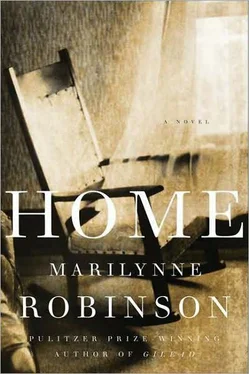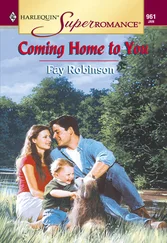Jack smiled at her across the table. “That’s good to know.”
The old man closed his eyes. “I can’t enjoy the thought of heaven like I should, leaving so much unattended to here. I know it’s wrong to think your mother’s going to ask me about it.” He was silent for a while, and then he said, “I was hoping I would be able to tell her that Jack had come home.”
Jack sat pondering his father, and there was something in his face more absolute than gentleness or compassion, something purged of all the words that might describe it. Finally he said, whispered, “I hope you will give her my love.”
The old man nodded. “Yes. I will certainly do that.”
AFTER HE HAD PUT HIS FATHER TO BED JACK CAME OUT TO the kitchen. He said, “Feel like a few games of checkers? I really can’t imagine going to sleep right now.”
“Neither can I.”
He said, “I’m sorry about that, Glory. These things never go the way I expect them to. You’d think I’d have learned by now. Not to expect.”
“You meant well.”
“I believe I did.”
“You did.”
“Yes,” he said, and nodded, as if he had steadied himself against this minor certainty. “I checked with Teddy. And it was your idea to begin with.”
“We both thought it was worth a try.”
“I didn’t try, though. Did you notice that? To lie to him. I lost my nerve.”
“That’s probably just as well.”
He shrugged. “I wouldn’t know.”
They played three wordless games, Jack so distractedly that Glory won despite her best efforts. She thought, There ought to be a name for this. Boughton checkers. Gandhi checkers.
He said, “You probably want to get some sleep.”
“Well, Jack, I just found out that I will inherit this house. I never meant to stay in Gilead. I mean I positively intended to leave Gilead. I don’t want to sound ungrateful, but I’m—‘horrified’ is too strong a word, but it’s the one that comes to mind. So I doubt I could sleep if I wanted to.”
Jack leaned back in his chair and looked around him, almost objectively. “It’s a pretty decent house. Free and clear. You could do worse.”
She said, “This is a nightmare I’ve had a hundred times. The one where all the rest of you go off and begin your lives and I am left in an empty house full of ridiculous furniture and unreadable books, waiting for someone to notice I’m missing and come back for me. And nobody does.”
He laughed. “Poor Pigtails.” Then he said, “When I have that dream, I’m hiding in the barn hoping someone will find me, and nobody does.”
“Well,” she said, “I’m going to get that barn torn down. If I inherit this place, that’s the first thing I’m going to do.”
“Fine. Should I make some coffee?”
“Might as well.”
Jack filled the percolator. Then he leaned against the counter. “It’s your barn. Of course, if you had somebody work on the roof a little, it would last a few more years. That’s just a thought. Paint would help.”
She laughed. “So you want me to keep the barn. What else should I keep?”
“What else are you planning to get rid of?”
“Oh, the rugs, the drapes, the wallpaper, the lamps, the chairs and sofas — a few dozen of the souvenir plates. The figurines.”
“Fine,” he said.
“Some of the bookcases. And Grandpa’s old theology books. There must be five hundred of them.”
“You’ll keep the Edinburgh books, I suppose.”
“Yes, I will keep them.”
“Some of the rest of it you could just put in the attic. I could move things around to make more room up there.”
“That’s a thought.”
He went across the hall to the dining room and flipped on the light, and stood in the doorway, his hands on his hips. “I see what you mean.”
“It looks like something out of The Old Curiosity Shop .”
“True.” But he kept looking around at it, the table and sideboard with their leonine legs and belligerently clawed feet, like some ill-considered, doily-infested species of which they were the last survivors. The wall sconces that were lotus blossoms with lightbulbs where their stamens ought to have been. She thought, Dear Lord, he is missing it all in anticipation. She thought, As long as he is alive in the world, or as long as no one knows otherwise, I will probably have to keep all that sour, fierce, dreary black walnut. That purple rug. And if he dies I will still have to keep it, because I have seen him look at it this way.
She said, “You want it to stay the same.”
“What? No, no. It doesn’t matter to me. Maybe I’ll be back here sometime,” he said, and it was clear from his tone that he doubted he would be. That he seemed to entertain doubt only for politeness’s sake. He said, “I’ve thought about this place now and then,” and he shrugged. The coffee was done and he gave her a cup and filled it and took one for himself.
She said, “No one will want me to change anything. When Papa’s gone they’ll come here twice a year or once a year or never, but they’ll want it all to be the same.”
He nodded. “You could sell it. Let someone else tear down the barn. Let the memory of Snowflake vanish once and for all. It would probably be best for everybody if you did that.” He knew he was proposing the unthinkable, and he smiled.
“Ah!” she said, and she rested her head on her arms. “I don’t want this to happen. Somehow I always knew this would happen to me.”
“It doesn’t have to. You could just light out, make a run for it. Let the others deal with it. No one would blame you. I wouldn’t, anyway.”
“No, I really couldn’t do that.”
“Sorry,” he said. And then he said, “It’s a relief to know you feel that way, Glory. I know I have no right to say this, but it is a relief to me. Of course, you can always change your mind.” He got the deck of cards and laid out a hand of solitaire.
WHEN SHE DID FINALLY GO UP TO HER ROOM AND LIE down as if to sleep, she fell to pondering the fact that she had almost promised him she would stay in Gilead and keep the house as it was, the grounds as they were, more or less weedy, more or less unpruned, but essentially the same. Even though he might never see it again. All that helpfulness of his, now that she thought about it, was restoration. Mother’s iris garden reclaimed, the Adirondack chairs repaired, the treads replaced on the back porch steps. It was a little like having the family come to life again to have him there, busy about the place the way her father used to be. When he had first come home, fearful as he was that he had become a stranger, he still came around to the kitchen door, that old habit.
She had thought of pulling down the barn because the worst hours of his life, surely, had passed in it. And she couldn’t walk into it without the thought of what might have happened, what she might have found, and then the terrible problem, the catastrophe it would have been for her father no matter what she could think of to say or do. Having to tell Teddy. It would have been the final insult, the most unpardonable desecration of everything they had somehow managed to cherish about him. Dear God in heaven. And then that hiding place he had made, comforting himself in concealment as he had always done. Or hiding his loneliness, or making his estrangement literal, visible. It was something a boy might do, that old game of hiding in the loft. He had done it as a boy and remembered, and maybe it made him feel at home. She should have pulled it apart herself, not left it for him to do. It was so profound a habit not to intrude on anything of his that she could hardly bring herself to do even what he had asked her. She wondered if he had taken it down, or if he might have left the house when she came upstairs and gone back to it again this very night. And then she wondered if he might not have another bottle hidden somewhere. In the DeSoto. She should have gone back to look around that afternoon, while he was sleeping. She hadn’t been thinking clearly.
Читать дальше












